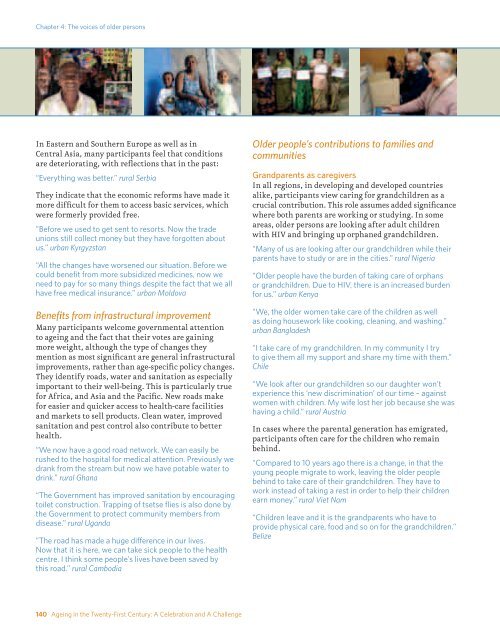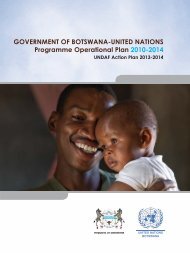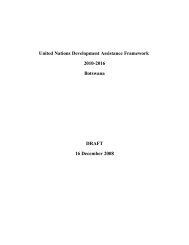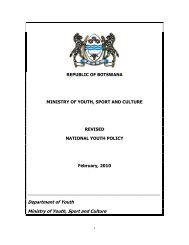Ageing in the Twenty-First Century: - HelpAge International
Ageing in the Twenty-First Century: - HelpAge International
Ageing in the Twenty-First Century: - HelpAge International
You also want an ePaper? Increase the reach of your titles
YUMPU automatically turns print PDFs into web optimized ePapers that Google loves.
Chapter 4: The voices of older persons<br />
In Eastern and Sou<strong>the</strong>rn Europe as well as <strong>in</strong><br />
Central Asia, many participants feel that conditions<br />
are deteriorat<strong>in</strong>g, with reflections that <strong>in</strong> <strong>the</strong> past:<br />
“Everyth<strong>in</strong>g was better.” rural Serbia<br />
They <strong>in</strong>dicate that <strong>the</strong> economic reforms have made it<br />
more difficult for <strong>the</strong>m to access basic services, which<br />
were formerly provided free.<br />
”Before we used to get sent to resorts. Now <strong>the</strong> trade<br />
unions still collect money but <strong>the</strong>y have forgotten about<br />
us.” urban Kyrgyzstan<br />
“All <strong>the</strong> changes have worsened our situation. Before we<br />
could benefit from more subsidized medic<strong>in</strong>es, now we<br />
need to pay for so many th<strong>in</strong>gs despite <strong>the</strong> fact that we all<br />
have free medical <strong>in</strong>surance.” urban Moldova<br />
Benefiits from <strong>in</strong>frastructural improvement<br />
Many participants welcome governmental attention<br />
to age<strong>in</strong>g and <strong>the</strong> fact that <strong>the</strong>ir votes are ga<strong>in</strong><strong>in</strong>g<br />
more weight, although <strong>the</strong> type of changes <strong>the</strong>y<br />
mention as most significant are general <strong>in</strong>frastructural<br />
improvements, ra<strong>the</strong>r than age-specific policy changes.<br />
They identify roads, water and sanitation as especially<br />
important to <strong>the</strong>ir well-be<strong>in</strong>g. This is particularly true<br />
for Africa, and Asia and <strong>the</strong> Pacific. New roads make<br />
for easier and quicker access to health-care facilities<br />
and markets to sell products. Clean water, improved<br />
sanitation and pest control also contribute to better<br />
health.<br />
“We now have a good road network. We can easily be<br />
rushed to <strong>the</strong> hospital for medical attention. Previously we<br />
drank from <strong>the</strong> stream but now we have potable water to<br />
dr<strong>in</strong>k.” rural Ghana<br />
“The Government has improved sanitation by encourag<strong>in</strong>g<br />
toilet construction. Trapp<strong>in</strong>g of tsetse flies is also done by<br />
<strong>the</strong> Government to protect community members from<br />
disease.” rural Uganda<br />
”The road has made a huge difference <strong>in</strong> our lives.<br />
Now that it is here, we can take sick people to <strong>the</strong> health<br />
centre. I th<strong>in</strong>k some people’s lives have been saved by<br />
this road.” rural Cambodia<br />
Older people’s contributions to families and<br />
communities<br />
Grandparents as caregivers<br />
In all regions, <strong>in</strong> develop<strong>in</strong>g and developed countries<br />
alike, participants view car<strong>in</strong>g for grandchildren as a<br />
crucial contribution. This role assumes added significance<br />
where both parents are work<strong>in</strong>g or study<strong>in</strong>g. In some<br />
areas, older persons are look<strong>in</strong>g after adult children<br />
with HIV and br<strong>in</strong>g<strong>in</strong>g up orphaned grandchildren.<br />
“Many of us are look<strong>in</strong>g after our grandchildren while <strong>the</strong>ir<br />
parents have to study or are <strong>in</strong> <strong>the</strong> cities.” rural Nigeria<br />
“Older people have <strong>the</strong> burden of tak<strong>in</strong>g care of orphans<br />
or grandchildren. Due to HIV, <strong>the</strong>re is an <strong>in</strong>creased burden<br />
for us.” urban Kenya<br />
“We, <strong>the</strong> older women take care of <strong>the</strong> children as well<br />
as do<strong>in</strong>g housework like cook<strong>in</strong>g, clean<strong>in</strong>g, and wash<strong>in</strong>g.”<br />
urban Bangladesh<br />
“I take care of my grandchildren. In my community I try<br />
to give <strong>the</strong>m all my support and share my time with <strong>the</strong>m.”<br />
Chile<br />
“We look after our grandchildren so our daughter won’t<br />
experience this ‘new discrim<strong>in</strong>ation’ of our time – aga<strong>in</strong>st<br />
women with children. My wife lost her job because she was<br />
hav<strong>in</strong>g a child.” rural Austria<br />
In cases where <strong>the</strong> parental generation has emigrated,<br />
participants often care for <strong>the</strong> children who rema<strong>in</strong><br />
beh<strong>in</strong>d.<br />
“Compared to 10 years ago <strong>the</strong>re is a change, <strong>in</strong> that <strong>the</strong><br />
young people migrate to work, leav<strong>in</strong>g <strong>the</strong> older people<br />
beh<strong>in</strong>d to take care of <strong>the</strong>ir grandchildren. They have to<br />
work <strong>in</strong>stead of tak<strong>in</strong>g a rest <strong>in</strong> order to help <strong>the</strong>ir children<br />
earn money.” rural Viet Nam<br />
“Children leave and it is <strong>the</strong> grandparents who have to<br />
provide physical care, food and so on for <strong>the</strong> grandchildren.”<br />
Belize<br />
140 <strong>Age<strong>in</strong>g</strong> <strong>in</strong> <strong>the</strong> <strong>Twenty</strong>-<strong>First</strong> <strong>Century</strong>: A Celebration and A Challenge







